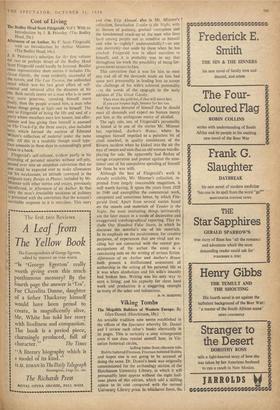Cost of Living
Afternoon of an Author, By F. Scott Fitzgerald, with an Introduction by Arthur Mizener. (The Bodley Head, 16s.) J. B. PRIESTLEY'S selection for thx first volume • (of two or perhaps three) of the Bodley Head Scott Fitzgerald could hardly be bettered. Besides three representative short stories it includes The Great Gatsby, the most evidently successful of the novels, and The Last Tycoon, the unfinished novel which . was his last great effort of self- control and retrieval after the disasters of his life. Both novels centre on a man who is in some vyay more generous, spending himself more freely, than the people around him, a man who keeps things going at high cost to himself. The cost to Fitzgerald of being the life and soul of a Party whose members were less honest, less affec- tionate and less giving than himself is assessed in The Crack-Up, the three essays, also included here, which formed the nucleus of Edmund Wilson's collection of material under the same title. All this in a readable though small type- face amounts in these days to outstandingly good value in a book.
Fitzgerald's self-reliance, evident partly in his recording of personal miseries without self-pity, Passed over into an unspoken conviction that no one could be expected ever to make allowances for. his weaknesses, an attitude conveyed in the no■gnnt story Design in Plaster, included by Mr. Mizener with other stories and essays, previously uncollected, in Afternoon of an Author. In that story the man's irresistible weakness of jealousy ! presented with the conviction that the woman'3 inevitable response to it is merciless. This story
and One Trip Abroad, also in Mr. Mizener's collection, foreshadow Tender is the Night, with its themes of jealousy, gradual corruption and the foredoomed crack-up of the man who lives hard among people not as sensitive as himself and who is—rightly? understandably?—at any rate inevitably cast aside by them when he has cracked. Fitzgerald was in effect merciless to himself, and it is probably true to say that throughout his work the possibility of being for- given never occurs to him.
This conviction that it was for him to meet any and all of the demands made on him had some part presumably in leading him to accept the challenge of his wife's schizoid personality —in the words of the epigraph to the early editions of The Great Gatsby, Then wear the gold hat, if that will move her; If you can bounce high, bounce for her too.
And the same demand of himself that he should meet all demands and expect no human mercy put him at the ambiguous mercy of alcohol.
The ugly side, too, of Fitzgerald's personality is hinted at in one of the stories Mr. Mizener has reprinted, Author's House, where he imagines himself impelled to a pointless bit of cruel mischief, in quality reminiscent of the Riviera incident when he kicked into the air the tray of sweets and nuts that an old woman was dis- playing for sale. He apparently had flashes of savage exasperation and protest against the emo- tional cost of his compulsive spending of himself for those he was with.
Although the best of Fitzgerald's work is already available, Mr. Mizener's collection, re- printed from largely inaccessible magazines, is well worth having. It spans the years from 1928 to 1940 and exemplifies the commercial work, competent and sometimes better, by which Fitz- gerald lived. Apart from several stories based on the moods and materials of Tender is the Night, the most interesting things intrinsically are the later essays in a mode of decorative and exaggerated autobiographical reporting. They in- clude One Hundred False Starts, in which he discusses the novelist's use of his materials. In its emphasis on the recalcitrance, for creative purposes, of experiences that are vivid and ex- citing but not connected with the central pre- occupations of the author the essay is a convincing note on the writing of serious fiction. Afternoon of an Author and Author's House both present a disillusioned assessment of authorship in the setting of his personal life as it was when alcoholism and his wife's insanity had broken him. Writing was his only way to earn a living; and his capacity for sheer hard work and production is a staggering example to many of the sober and industrious.
D. W. HARDING


































 Previous page
Previous page